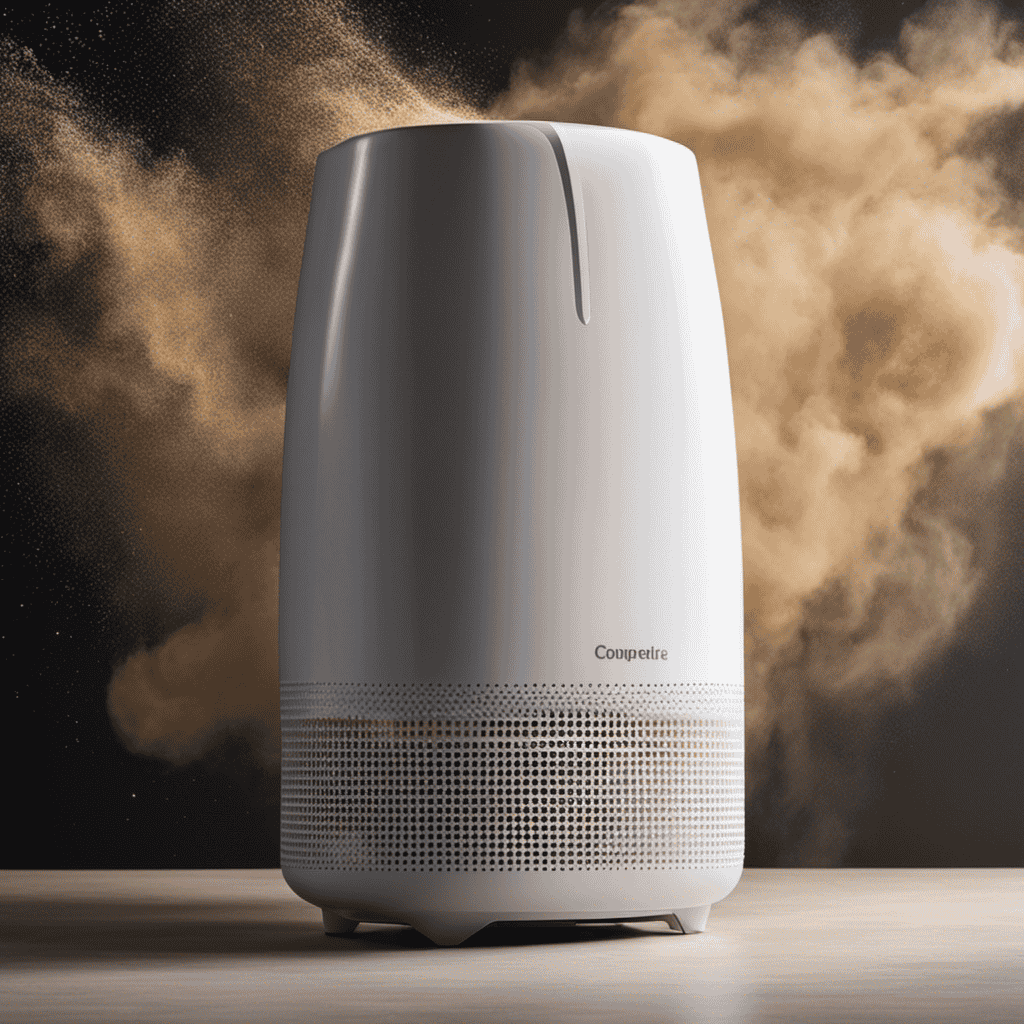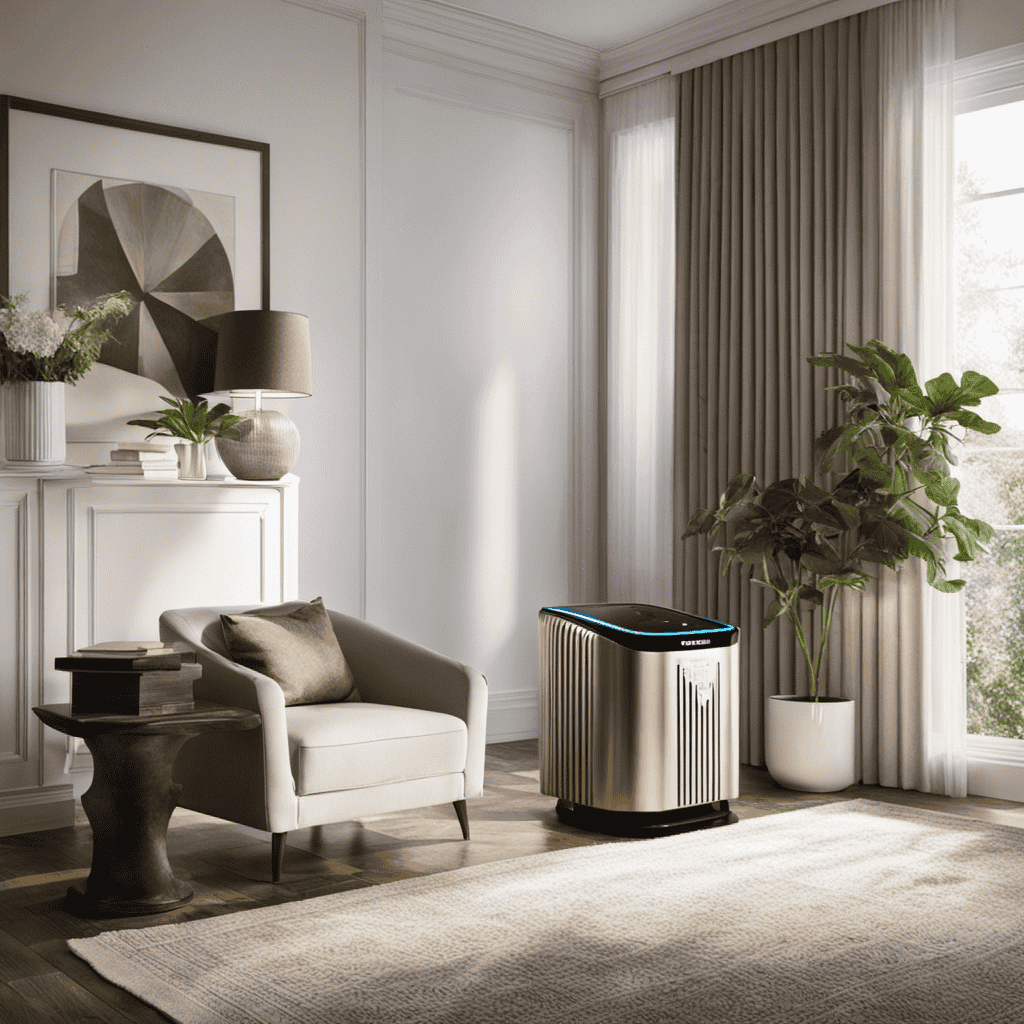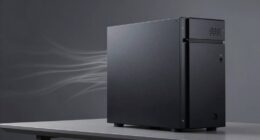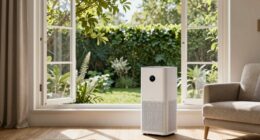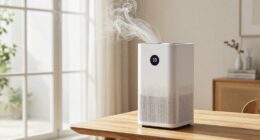As someone who has experienced different illnesses, I can confirm the benefits of using an air purifier when feeling unwell. The comforting noise of the device, the refreshing aroma it releases, and the purified air it offers all play a role in aiding a speedier healing process.
In this article, I will outline the benefits of using an air purifier when sick, discuss the different types of purifiers available, and provide tips for choosing the right one for your specific illness.
So, let’s dive in and discover how air purifiers can help us breathe easier during times of sickness.
Key Takeaways
- Air purifiers can remove allergens such as pollen, dust mites, and pet dander from the air, improving indoor air quality for individuals who are sick.
- Air purifiers eliminate airborne viruses and bacteria, reducing the risk of transmission and promoting a healthier space.
- Different types of air purifiers, such as HEPA purifiers, UV-C purifiers, activated carbon purifiers, and ionizers, offer various benefits for sick individuals, including capturing small particles, killing microorganisms, neutralizing odors, and making airborne particles fall to the ground.
- Regular maintenance of air purifiers is crucial for their effectiveness in removing allergens and viral particles from the air.
Benefits of Using an Air Purifier When Sick
Using an air purifier can help me feel better when I’m sick.
Air purifiers have many benefits for allergies and respiratory conditions.
When I have allergies, the air purifier helps to remove allergens such as pollen, dust mites, and pet dander from the air, reducing my symptoms and making it easier for me to breathe.
It also helps to eliminate airborne viruses and bacteria, which can be especially beneficial when I have a respiratory condition.
The purifier’s filters trap these harmful particles, preventing them from circulating in the air and potentially exacerbating my illness.
Additionally, air purifiers can help to reduce odors, making the air in my home feel fresher and cleaner.
Overall, using an air purifier is a simple and effective way to improve my comfort and well-being when I’m sick.
Types of Air Purifiers for Sick Individuals
When you’re feeling under the weather, there are different types of air purifiers that can provide relief. As someone who has experienced the benefits firsthand, I can say that air purifiers are effective in improving indoor air quality and alleviating symptoms of sickness.
Here are four types of air purifiers that can help when you’re sick:
-
HEPA Air Purifiers: These purifiers use high-efficiency particulate air filters to capture small particles like pollen, dust, and pet dander, providing cleaner and healthier air.
-
UV-C Air Purifiers: These purifiers use ultraviolet light to kill bacteria, viruses, and other microorganisms in the air, reducing the risk of airborne illnesses.
-
Activated Carbon Air Purifiers: These purifiers contain activated carbon filters that effectively neutralize odors and trap harmful chemicals and gases.
-
Ionizers: These purifiers release negatively charged ions into the air, which attach to airborne particles and make them heavier, causing them to fall to the ground.
To maintain the effectiveness of your air purifier, regular maintenance is crucial. This includes cleaning or replacing filters, wiping down the unit, and keeping the surrounding area free from dust and debris. By taking care of your air purifier, you can ensure that it continues to provide relief when you need it most.
How Air Purifiers Improve Indoor Air Quality for Illness Recovery
Air purifiers have numerous benefits when it comes to improving indoor air quality for illness recovery.
Firstly, they help reduce allergens in the air, such as dust mites, pollen, and pet dander, which can trigger allergies and worsen respiratory symptoms.
Secondly, air purifiers have the ability to remove viral particles from the air, which is particularly beneficial during flu season or when dealing with contagious illnesses.
Lastly, by improving the air quality and reducing the presence of harmful particles, air purifiers can contribute to a faster healing process and overall better recovery outcomes.
Allergen Reduction Benefits
Reducing allergens is a key benefit of using an air purifier when you’re sick. As someone with allergen sensitivity, I understand the importance of clean air for respiratory relief. Here are four reasons why air purifiers can help alleviate allergen-related symptoms:
-
Filtration: Air purifiers use filters to trap allergens like pollen, dust mites, and pet dander, preventing them from circulating in the air.
-
Dust Reduction: By capturing dust particles, air purifiers can reduce the amount of dust in your home, providing relief for those with respiratory issues.
-
Mold Prevention: Air purifiers can help prevent the growth of mold by reducing moisture in the air and removing spores, which can trigger allergies.
-
Pet Allergen Control: If you have pets, air purifiers can effectively remove pet allergens from the air, providing relief for those with pet allergies.
Viral Particle Removal
If you’re feeling unwell, using an air purifier can be effective in removing viral particles from your environment and promoting a healthier space. Air purifiers are designed to filter and trap airborne contaminants, including viruses, helping to reduce the risk of transmission. Regular maintenance is essential to ensure the effectiveness of your air purifier. This includes cleaning or replacing filters as recommended by the manufacturer. The table below highlights the key benefits of using an air purifier and the maintenance tasks required.
| Benefits | Maintenance Tasks |
|---|---|
| Removes viral particles | Clean or replace filters regularly |
| Reduces the risk of transmission | Keep the purifier in a well-ventilated area |
| Promotes a healthier space | Clean the exterior of the purifier |
| Improves indoor air quality | Check the manufacturer’s instructions for specific maintenance guidelines |
| Provides peace of mind | Schedule professional maintenance if necessary |
Faster Healing Process
To expedite your healing process, it’s important to prioritize rest and proper nutrition. When you’re sick, your body requires extra energy to fight off illness and recover faster. Taking care of your immune system is crucial during this time.
Here are four key ways to support your immune system and promote faster recovery:
-
Hydrate: Drinking plenty of fluids helps flush out toxins and keeps your body hydrated, aiding in the healing process.
-
Eat nutritious foods: Incorporate fruits, vegetables, lean proteins, and whole grains into your diet to provide essential vitamins and minerals that support your immune system.
-
Get enough sleep: Rest is vital for your body to repair and regenerate cells. Aim for 7-9 hours of quality sleep each night.
-
Manage stress: Chronic stress can weaken your immune system. Practice relaxation techniques like deep breathing, meditation, or engaging in activities you enjoy.
By following these guidelines, you can give your body the support it needs to recover faster.
Now, let’s explore the key features to look for in an air purifier for sick individuals.
Key Features to Look for in an Air Purifier for Sick Individuals
When you’re sick, one key feature to look for in an air purifier is a HEPA filter. HEPA stands for High Efficiency Particulate Air, and these filters are designed to capture small particles like dust, pollen, and bacteria, which can exacerbate respiratory symptoms.
As a sick individual, it is important to maintain your air purifier regularly to ensure its effectiveness. Simple maintenance tasks include cleaning or replacing the filter as recommended by the manufacturer, wiping down the exterior, and keeping the unit in a well-ventilated area.
Additionally, when searching for cost-effective options, consider air purifiers with reusable filters or ones that have longer filter lifespans. These options can help save money in the long run while still providing the necessary purification for your health.
Common Illnesses That Can Benefit From Air Purifier Use
For those with common illnesses, it’s crucial to understand which specific symptoms can be alleviated through the use of an air purifier. Air purifiers have been shown to provide numerous benefits for individuals suffering from respiratory conditions or allergies.
Here are four common illnesses that can benefit from air purifier use:
-
Asthma: Air purifiers can remove airborne triggers such as dust mites, pet dander, and pollen, reducing asthma symptoms and improving overall lung function.
-
Allergies: Air purifiers can capture allergens like mold spores, dust, and pollen, providing relief from allergy symptoms and creating a cleaner indoor environment.
-
Sinusitis: Air purifiers can help remove airborne irritants such as bacteria, viruses, and dust particles, reducing the risk of sinus infections and relieving nasal congestion.
-
Chronic obstructive pulmonary disease (COPD): Air purifiers can filter out harmful pollutants, such as smoke and chemicals, helping individuals with COPD breathe easier and reducing the risk of exacerbations.
Tips for Properly Using an Air Purifier When Sick
If you’re feeling under the weather, it’s important to follow these tips to ensure you’re using your air purifier correctly.
First, consider the placement of your air purifier. It’s best to place it in the room where you spend the most time, such as your bedroom or living room. Make sure it’s not blocked by furniture or curtains, as this can hinder its effectiveness.
Additionally, proper maintenance of your air purifier is crucial. Regularly clean or replace the filters according to the manufacturer’s instructions to keep it running efficiently.
By following these tips, you can maximize the benefits of your air purifier when you’re sick.
Now, let’s move on to the next section about choosing the right air purifier for your specific illness.
Choosing the Right Air Purifier for Your Specific Illness
To choose the right air purifier for your specific illness, consider factors such as the size of the room, your budget, and the type of particles you want to remove. Here are four key points to keep in mind when selecting an air purifier for allergies or respiratory infections:
-
Room size: Make sure to choose an air purifier that is suitable for the size of the room where you will be using it. A purifier with a higher Clean Air Delivery Rate (CADR) is recommended for larger rooms.
-
Filtration system: Look for an air purifier with a HEPA (High-Efficiency Particulate Air) filter. These filters can capture particles as small as 0.3 microns, effectively removing allergens, dust, and bacteria from the air.
-
Additional features: Consider additional features that can enhance the purifier’s effectiveness, such as an activated carbon filter to remove odors or a UV-C light to kill germs.
-
Noise level: Check the noise level of the air purifier, especially if you plan to use it in a bedroom or a quiet space. Look for models with a low noise level for a peaceful environment.
Frequently Asked Questions
Can an Air Purifier Completely Eliminate All Bacteria and Viruses From the Air?
An air purifier cannot completely eliminate all bacteria and viruses from the air. While it can help reduce their presence, it has limitations. It is important to follow other preventive measures for a healthier environment.
How Long Does It Take for an Air Purifier to Improve Indoor Air Quality for Illness Recovery?
Using an air purifier can significantly improve indoor air quality and aid in illness recovery. It’s amazing how quickly it works! Within a short timeframe, you’ll notice a difference in the air you breathe.
What Is the Recommended Room Size for an Air Purifier to Effectively Help With Illness Recovery?
The recommended room size for effective air purifier use depends on the model’s coverage area. To ensure optimal results, check the manufacturer’s specifications. A properly sized air purifier can help improve indoor air quality, aiding in illness recovery.
Can an Air Purifier Help Alleviate Symptoms of Allergies in Addition to Respiratory Illnesses?
Yes, an air purifier can help alleviate symptoms of allergies and respiratory illnesses. Its effectiveness lies in its ability to remove allergens, pollutants, and irritants from the air, providing numerous benefits for those suffering from these conditions.
Are There Any Potential Side Effects or Risks Associated With Using an Air Purifier When Sick?
There are potential health risks associated with using air purifiers when sick. It’s important to consider the effectiveness of air purifiers and consult with a healthcare professional to ensure they are safe for your specific condition.
Conclusion
In conclusion, using an air purifier when I’m sick has been a game-changer for me. Not only does it help improve the air quality in my home, but it also aids in my illness recovery.
It’s like a breath of fresh air, both literally and figuratively. With its ability to filter out harmful particles and allergens, it provides a sanctuary for my healing process.
So, if you’re battling an illness, don’t hesitate to invest in an air purifier tailored to your specific needs. It’s a small step towards a healthier and happier you.


